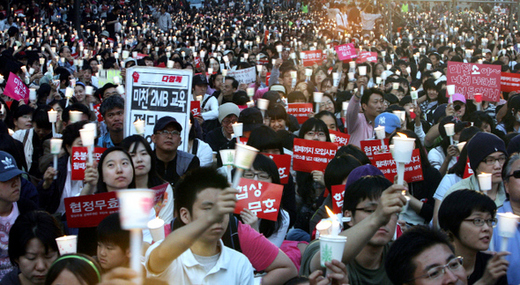S Korea, US continue consultations on beef: envoy

Yonhap | 19 May 2008
S. Korea, U.S. continue consultations on beef: envoy
By Lee Chi-dong
SEOUL, May 19 (Yonhap) — South Korea and the United States are continuing consultations on the controversial issue of beef trade, with public protests here over a related deal showing no signs of abating, the top U.S. envoy here said Monday.
"We have been continuing consultations with the aim of clearing up some misunderstandings in Korea about the agreement that was reached last month," Ambassador Alexander Vershbow told Yonhap News Agency after his lecture at a Seoul college.
He cited misinterpretation of regulations regarding specified risk materials (SRMs), saying the criteria that apply for domestic production also apply for all exports.
His comments followed reports that Seoul and Washington have agreed in principle to guarantee Seoul’s quarantine sovereignty in written form.
South Korean trade officials plan to announce the measure later this week, an apparent bid to cool down public fury over the beef deal that was sealed on the eve of the Camp David summit between the presidents of the two nations last month.
Critics have argued that the hastily-signed agreement lacks proper measures for South Korea to stave off dangers of mad cow disease. Especially, the deal does not allow Seoul to halt American beef imports even if the fatal disease is found again.
Vershbow declined to talk about whether there will be any additional agreement on beefing up Seoul’s quarantine sovereignty.
"The agreement itself stands as it is," he said. "But we are trying to provide clarifications of some issues that have raised concerns in Korea. There was some letters exchanged just to explain these clarifications ...No new negotiations."
He reiterated the official stance of U.S. trade authorities that South Korea has a way to take steps to protect public health despite the bilateral trade agreement.
"The GATT and the WTO SPS Agreement preserve each country’s sovereignty so that every government can ensure the safety of its citizens, and that includes food safety," Trade Representative Susan C. Schwab said earlier in a statement. "The United States recognizes that Article XX of the GATT preserves Korea’s right to take measures necessary to protect public health, so long as the requirements of that article are met."
Many trade experts here raise doubts over the feasibility, however, citing the rarity of the stipulations being actually applied to override a bilateral deal.
Vershbow also apportioned some blame to former South Korean President Roh Moo-hyun, who he claimed broke his earlier promise on American beef imports, joining a political controversy here.
During his 90-minute lecture at Sungshin Women’s University, the U.S. ambassador said Roh broke his promise on importing U.S. beef. Roh pledged to reopen the beef market "on the basis of the scientific guidelines of the World Organization for Animal Health or the OIE," Vershbow said. He stressed again that the OIE certified a year ago that there is no risk of mad cow disease in US beef.
"Unfortunately after his party was defeated in the December presidential election, President Roh decided not to fulfill his promise and follow the science," Vershbow said.
President Lee and his aides claims that the decision to resume U.S. beef imports was originally attributable to Roh, once supported by many critics of the troubled beef trade pact.
Vershbow sought to calm controversy over the neutrality of the OIE, saying "its work is guided by science. It is not an American-dominated organization."
He stressed that the beef agreement is a main vehicle for the viability of the free trade agreement between South Korea and the U.S. which is now pending legislative approval.
Citing media skepticism over the U.S. ratification of the FTA in the election year, he said the Bush administration is committed to persuading the Congress and winning approval.
"We worked too hard and too long to lose this historic opportunity," he said.
Vershbow faced a barrage of questions from students on the beef issue, reflecting public interest in it.
He responded with wit, "As you can see, as a diplomat, I have to study a lot about American beef,"
In a related move, the South Korean leader plans to soon meet with the leaders of opposition parties to ask for cooperation in the ratification of the FTA. No date has been announced yet.





